Live on the homepage now!
Reader Supported News
Gas prices will likely rise, just in time for the midterm elections. Was this the point? It doesn’t take a conspiracy theorist to start putting some troubling pieces together.
You have a regime in Riyadh that was chummy with Donald Trump and his inner circle, especially son-in-law Jared Kushner, with whom the Saudis “invested” $2 billion. And let’s be clear, nobody who is actually looking for a return on their investment would invest in Jared. What was that really about?
The Saudis are led by Mohammed bin Salman, a young autocrat with a reputation for ruthlessness, whose treatment of his own people is marked by atrocious human rights abuses. U.S. intelligence says he personally gave the go-ahead for the brutal murder of Jamal Khashoggi, a Saudi journalist and critic of the regime who wrote for The Washington Post. What a “prince” (well, he’s technically a prince, but you get the point).
The Saudis have been forging stronger ties with Russia, which desperately wants higher energy prices to help it evade Western sanctions and put more pressure on the West to back away from support for Ukraine. So this move clearly reflects the triumph of Putin’s interests over America’s (again bringing us back to the specter of Trump).
Then there is the matter of the missing top secret documents Trump had at Mar-a-Lago. We have seen no proof that the Saudis are involved in that saga, but it’s understandable that so many conspiracy theories would revolve around such speculations.
After all, there is so much about America’s relationship with Saudi Arabia that is shady, and this is just what we know about.
One thing is certain: Saudi Arabia and the other Gulf states have made a very strong statement in rebuffing requests from the United States not to cut production at a perilous time for the world economy. You could try to use the vocabulary of diplomacy to put what happened into context. But another way of looking at it is that the United States sent a long text message to its supposed “friend” group in the Middle East imploring them not to do this and got in return a single emoji with a raised middle finger.
For decades, the United States has walked a tenuous line — dependent on Saudi crude (and happy for a bulwark against Iran) while overlooking a human rights record that is among the worst in the world.
Along the way, the U.S. saved the Saudis from Saddam Hussein and Iraq when they were severely threatened near the end of the last century. And more recently has been protecting them from Iran.
These dynamics offer a real-world example of realpolitik, a foreign policy based on a cost-benefit analysis measured in energy prices and the complexities of the Middle East instead of the values of freedom and democracy that the United States has long espoused. Critics who say all this talk of American values represents rank hypocrisy often have pointed to Saudi Arabia as example 1A.
So where do we go from here? One imagines that the Biden administration had to be planning for this contingency. The president traveled to Saudi Arabia in July to try to ward off the kind of action we saw today — a trip for which he was heavily criticized by those rightly outraged by the Kingdom’s atrocities. Now, that effort has obviously failed.
It is past time for a reckoning between the United States and Saudi Arabia, something that should have happened long ago — such as after 9/11 (15 of the 19 hijackers were Saudi). Any notion that the Faustian bargain we’ve forged with the Kingdom makes sense should be shattered by this latest development.
All options are now, or should be, on the table. Should we halt military sales to Saudi Arabia? Should we find ways to break up the power of OPEC? There is reporting from The Wall Street Journal that the Biden administration may be turning to Venezuela. What other pressure points can be exerted?
What is also clear is that we are seriously overdue to wean ourselves off of fossil fuels — for the sake of the planet, as well as our national and economic security. The Saudis have played their hand. Have they overplayed it? Perhaps they can ask their friend Vladimir how things are turning out.
READ MORE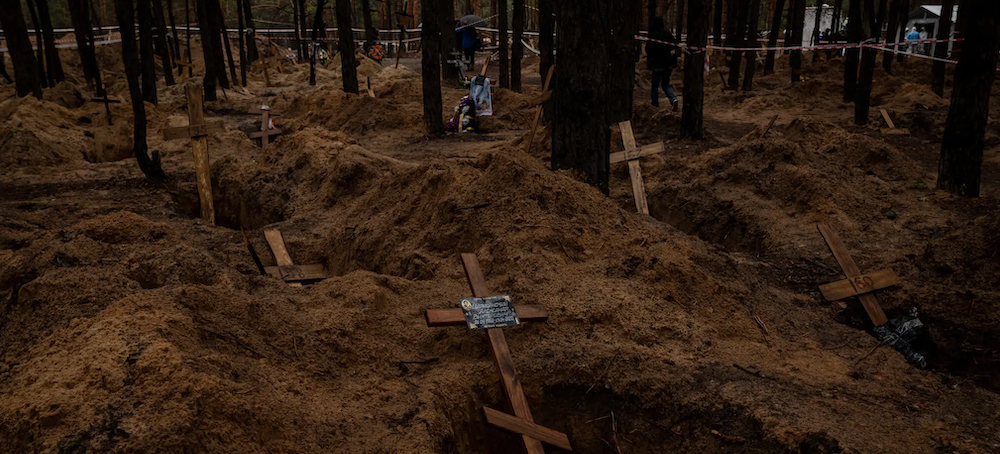 Exhumed graves at a mass burial site in Izium, Ukraine. (photo: Nicole Tung/NYT)
Exhumed graves at a mass burial site in Izium, Ukraine. (photo: Nicole Tung/NYT)
ALSO SEE: After Russian Retreat in East Ukraine,
Police Find Dozens of Torture Sites
The bodies included 226 women and 19 children. Most of the civilian bodies recovered — 447 — were found in a mass burial site in Izium.
The police have also discovered 22 locations that they suspect were used as torture chambers in areas of Kharkiv Province that were recently freed from Russian control, he said. Investigators have been gathering documents and other evidence from the sites and witness testimony, including from former detainees.
“Russian units set up such places of detention of civilians and prisoners of war in almost all the settlements where they were based,” Mr. Bolvinov said.
Ukrainian troops have recaptured nearly 500 towns and villages since Sept. 7 in a sweeping counterattack that has pushed Russian forces out of most of Kharkiv Province after nearly seven months of occupation.
“The most common torture techniques were electric shocks and severe beatings with sticks and other objects,” Mr. Bolvinov said. “There are cases of pulling out nails and using gas masks to restrict breathing.”
Most of the victims were residents who were detained for violating the nightly curfew or accused of acting as target spotters for Ukrainian artillery attacks.
In one instance, Mr. Bolvinov said, a pensioner from Izium traveled out of the city but then returned for personal reasons. After a Ukrainian artillery strike on Izium on Aug. 29 the pensioner was detained at his home and taken to the local police station, which Russian troops were using as a military headquarters, Mr. Bolvinov said. The building is one of the locations being investigated as a torture chamber.
“People speaking with a Russian accent demanded to know who he was passing the coordinates to,” Mr. Bolvinov said, reading from the witness record. They hit the pensioner with a tube, breaking his arm, and pushed metal spokes from a bicycle wheel under his skin in the area of his shoulder blades. After two hours of torture, the man lost consciousness from the pain, Mr. Bolvinov said.
The police were also investigating a case in the village of Pisky-Radkivski, east of Izium, where a group of about 10 Russian soldiers, including a commander, set up a headquarters in a private house, Mr. Bolvinov said. They seized the home and two cars from a resident, he said.
“We have witnesses who heard screams from the basement, pleas for help,” Mr. Bolvinov said. “Sometimes, after the screams, the locals heard bursts of shots, after which the screams stopped.”
In the basement of the house, the police found ropes, Ukrainian army jackets, a gas mask, a dildo and a plastic container with dentures and gold teeth. Investigators also found records of testimony by Ukrainian prisoners.
Mr. Bolvinov said the authorities were investigating whether the teeth were evidence of torture or had been taken from a dentist’s practice. The teeth have been sent for DNA analysis, he said.
READ MORE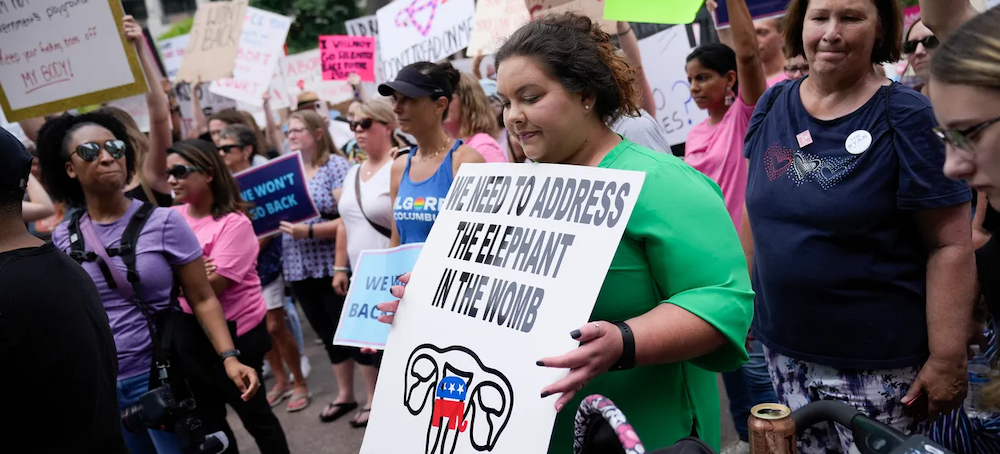 A rally for abortion rights at the Ohio Statehouse in Columbus. (photo: Brooke LaValley/Columbus Dispatch)
A rally for abortion rights at the Ohio Statehouse in Columbus. (photo: Brooke LaValley/Columbus Dispatch)
ALSO SEE: Arizona Court Halts Enforcement of Near-Total Abortion Ban
A permanent injunction that halts Ohio’s Heartbeat Law was granted by Common Pleas Court Christian Jenkins.
It is “simply wrong” to argue that a “right does not exist because it is not specifically listed in the (U.S.) Constitution,” Jenkins said, according to the Associated Press.
Jenkins granted a temporary restraining order Sept. 14 at the request of the Kettering Woman’s Center and other pro-choice organizations. News Center 7′s Mike Campbell was in the courtroom Friday as the judge presided over a preliminary injunction hearing on the matter.
Michelle Diamond, one of half-dozen lawyers arguing against the state’s six-week abortion ban, said allowing the ban to go into effect would “do devastating damage to women in Ohio.”
The medical director of Planned Parenthood of Ohio, who chose not to be photographed, claimed the law made women across the state despondent when they couldn’t receive care.
“Sometimes they would get desperate and try to figure out how to take matters into their own hands or threaten to harm themselves,” the director said in court.
Lawyers for the State of Ohio argued that the law is fair, includes exceptions and after being passed by lawmakers and signed by the governor, should become that law in Ohio. They also said pro-choice groups and clinics have not shown that the law does irreparable harm to them.
The state’s lawyers also called on a professor of biomedical ethics, who argued that abortion is not healthcare.
“Deliberate induced abortion, it separates one human organism from another and there is no disease being treated,” Dr. Dennis Sullivan said.
Following the ruling Friday afternoon, leaders from Planned Parenthood Federation of America, Planned Parenthood of Greater Ohio, Planned Parenthood Southwest Ohio, the American Civil Liberties Union, ACLU of Ohio, Preterm-Cleveland, Women’s Med Group Professional Corporation, Northeast Ohio Women’s Center, Toledo Women’s Center, and Dr. Sharon Liner issued the following statement:
“We are thrilled with this second major victory and relieved that patients in Ohio can continue to access abortion as we work to fight this unjust and dangerous ban in court. The preliminary injunction will be in place for the duration of our case, which means abortions will be legal in Ohio for a period much, much longer than the temporary restraining order granted. This court ruling will provide significant relief to Ohio patients and clinics. We’ve already had a glimpse of the harm caused by Senate Bill 23 when it was in effect this summer, and we can’t go back. Ohioans deserve far better than the chaos and confusion that we’ve seen since the U.S. Supreme Court stripped us of our federal constitutional right to an abortion. We will continue to use every tool at our disposal to fight for and protect Ohioans’ rights as guaranteed by the Ohio Constitution. We will now work to secure a permanent injunction.”
Dayton Right to Life said the following:
“Dayton Right to Life and other statewide leaders were in the courtroom for today’s hearing. It was clear from the beginning Judge Jenkins was going to block the law and the will of the people. This is not justice, this is judicial activism.”
Democratic gubernatorial nominee and former Dayton Mayor Nan Whaley had this to say:
“Too many women have already suffered under Governor Mike DeWine’s extreme abortion ban. While this ruling is a victory and without doubt will save women and girls from the difficult decision of choosing between accessing health care or leaving the state, we know that this is not the end - DeWine has promised anti-choice groups that he’ll go as far as possible in prohibiting abortion in Ohio. The only way to guarantee a woman’s freedom to make her own health care decisions is to elect a pro-choice governor who will work to codify these protections in the Ohio Constitution. Our freedom is at stake. Abortion is on the ballot this November.”
Friday night, Gov. Mike DeWine’s spokesman, Daniel Tierney, said the governor had no statement.
State Rep. Jeff Crossman, Democratic nominee for Ohio attorney general, released this statement:
“We think this is the correct decision. We believe Dave Yost will appeal it and continue his attacks on reproductive rights and freedoms for women in Ohio. As Ohio’s next Attorney General, I will dismiss this appeal, and confirm once and for all the constitutionality of all women’s reproductive rights and abortion care in this state.”
READ MORE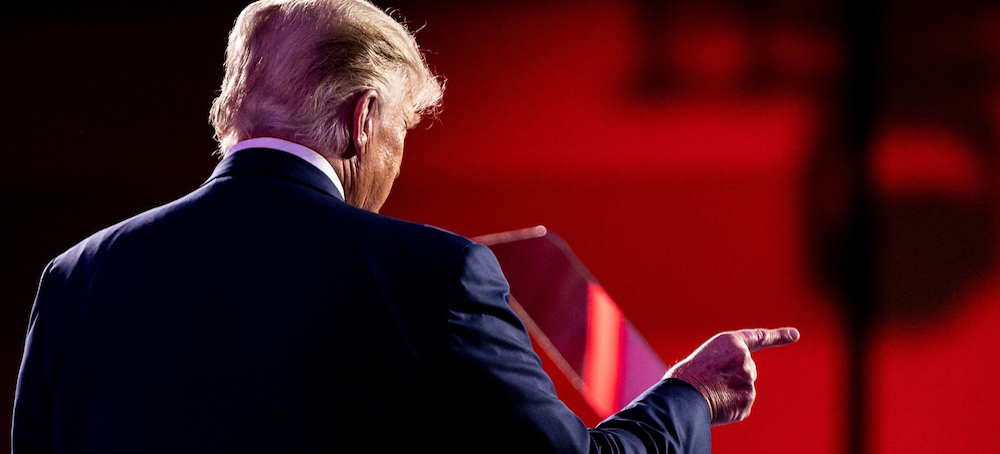 Donald Trump. (photo: Erin Schaff/NYT/Redux)
Donald Trump. (photo: Erin Schaff/NYT/Redux)
ALSO SEE: Justice Dept. Is Said to Believe Trump Has More Documents
Investigators have quizzed multiple witnesses about whether Trump is holding sensitive government documents at other properties outside Mar-a-Lago, including at his Manhattan tower and his New Jersey club
The FBI, according to these sources, had also asked in recent months whether the ex-president had a habit of transporting classified documents from his Florida estate Mar-a-Lago to the other Trump properties. The feds specifically discussed both the New York City and Bedminster locations with certain witnesses.
“It was obvious they wanted to know if this went beyond just Mar-a-Lago,” the first source says.
The Justice Department declined a request for comment from Rolling Stone. Trump attorneys and a spokesperson for the former president did not respond to requests.
The interviews suggest that the Justice Department may believe that Trump’s retention of documents extended beyond Mar-a-Lago, though it’s unclear if there’s any evidence Trump is storing documents outside his Florida property.
On Thursday, The New York Times reported that the Justice Department informed Trump’s legal team it believes the former president may have taken more documents than the ones the FBI returned to the National Archives after its August Mar-a-Lago search. Trump attorney Christopher Kise reportedly suggested that the former president voluntarily conduct a search for any further missing documents at another unnamed Trump property, according to the Times.
The FBI has been quietly interviewing a number of former Trump associates as part of its inquiry into his retention of classified documents. In August, Rolling Stone reported that FBI agents had interviewed former Trump National Security Council staff and asked them whether they were aware of the so-called standing declassification order that Trump’s office has claimed the former president put in place for classified materials taken from the West Wing.
The increased law enforcement scrutiny since the FBI search of Mar-a-Lago has prompted Trump to wonder aloud who in his circle could be helping the Justice Department’s investigation. In exchange with associates, Trump has asked whether anyone in MAGA world could be “wearing a wire” or if his phones are “tapped.” In private, associates of the former president told Rolling Stone that Trump remains focused on getting back “all” of the documents — even classified ones — taken by the FBI back, referring to them as “mine.”
READ MORE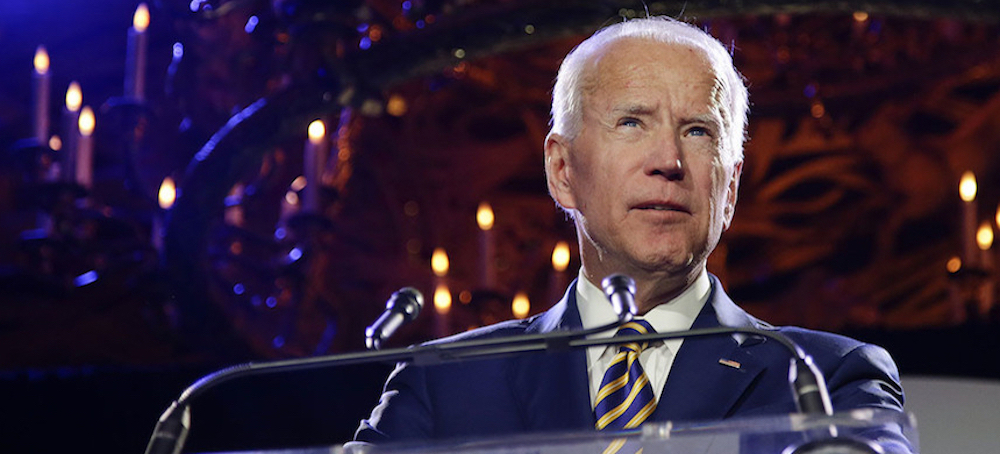 Joe Biden. (photo: Frank Franklin II/AP)
Joe Biden. (photo: Frank Franklin II/AP)
President Joe Biden announced Thursday that he is pardoning everyone convicted of simple marijuana possession under federal law, and said the classification of the drug would undergo review. The move will remove many legal barriers for thousands of people to gain jobs, housing, college admission and federal benefits, and fulfills a campaign pledge made by Biden. However, the pardons will only affect about 6,500 people, as the vast majority of drug charges are at the state level and are disproportionately affecting communities of color. “We are demanding that the president actually deschedule and decriminalize cannabis,” says Kassandra Frederique, executive director of the Drug Policy Alliance.
President Biden has announced he’ll pardon anyone convicted of simple marijuana possession under federal law, in a major step towards the decriminalization of cannabis. Biden announced his plan in a video posted on social media.
PRESIDENT JOE BIDEN: As I said when I ran for president, no one should be in jail just for using or possessing marijuana. It’s already legal in many states. And criminal records for marijuana possession have led to needless barriers to employment, to housing, to educational opportunities. And that’s before you address the racial disparities around who suffers the consequences. While white and Black and Brown people use marijuana at similar rates, Black and Brown people are arrested, prosecuted and convicted at disproportionately higher rates.
So, today, I’m taking taking three steps to end this failed approach.
First, I’m announcing a pardon for all prior federal offenses for the simple possession of marijuana. There are thousands of people who are convicted for marijuana possession who may be denied employment, housing or educational opportunities as a result of that conviction. My pardon will remove this burden on them.
Second, I’m calling on all governors to do the same for state marijuana possession offenses.
Third, the federal government currently classifies marijuana as a Schedule I substance, the same as heroin and LSD, and more serious than fentanyl. It makes no sense. So I’m asking the secretary of health and human services and the attorney general to initiate a process to review how marijuana is scheduled under federal law.
Even as federal and local regulations of marijuana change, important limitations on trafficking, marketing and underage sales should stay in place.
Too many lives have been upended because of our failed approach to marijuana. It’s time that we right these wrongs.
AMY GOODMAN: As President Biden calls on governors to also pardon people found guilty of marijuana charges at the state level, we’re joined now by Kassandra Frederique. She is the executive director of the Drug Policy Alliance.
Thanks for being with us. Were you surprised, Kassandra, by this announcement? So often when you come to a point like this, the pardoning of all people convicted of marijuana possession at the federal level, it is grassroots organizations and alliances that have pushed something like this forward.
KASSANDRA FREDERIQUE: Yeah. Thank you so much for having me, Amy. I’m really happy to be here.
I think we were open to the president’s announcement. For a really long time, groups on the ground have been pushing for us to get to a place where we’re descheduling, decriminalizing, reinvesting in communities and really leaving cannabis prohibition behind. And so, the president’s announcement yesterday was an opening gesture to a much broader conversation.
AMY GOODMAN: Well, before we talk about that broader conversation, explain what it means. He’s talking about federal charges. Anyone convicted of federal charges of pot possession are pardoned. So, who does this include, and who doesn’t it include?
KASSANDRA FREDERIQUE: So, it’s important to contextualize that these pardons actually remove legal barriers to things like employment, housing, licensing, public benefits. And this is an arena of around 6,500 people. Most people that are currently in the federal system are not there for simple possession. But this is going to be really helpful for those 6,500 people. It will also cover those in the District of Columbia, who are under this federal jurisdiction, that they will also have the opportunity to get their offenses — their code offenses pardoned, as well.
AMY GOODMAN: So, we’re talking about people who are in prison currently, is that right? And also, of course, people who are not in prison but have this record. How many, do you know, will be freed from prison immediately?
KASSANDRA FREDERIQUE: So, what we have found is that there are not that many people, if any people, that are currently in the federal system currently solely for simple possession. What we know is that a majority of the people that are going to be impacted by this pardon are people who have these convictions who are currently navigating the really devastating collateral consequences associated with a federal conviction on simple possession. Remember that this is about removing legal barriers, but these people still have convictions on their records.
And the other thing that’s important is that this doesn’t — that noncitizens were excluded from this, which is really unfortunate, because people who are noncitizens, cannabis is one of the main reasons why people are detained or deported. So, as I said, this is an opening gesture for what we are pushing for to be a broader conversation.
AMY GOODMAN: Let me elaborate on that further with a quote from Jane Shim, the senior policy attorney for the Immigrant Defense Project. Her statement reads in part, “it is extremely disappointing that the Administration went out of its way to exclude undocumented immigrants. Furthermore, even immigrants who were pardoned may remain at risk of detention and deportation because of a marijuana offense, thanks to our punitive immigration laws.” Kassandra?
KASSANDRA FREDERIQUE: That’s exactly right. And, you know, Drug Policy Alliance has learned an incredible amount of the intricacies between immigration policy and drug policy over the last decade. And in fact, most people don’t realize that our first drug laws were xenophobic immigration policies. And so, this is why Drug Policy Alliance is working with our groups around the country to really figure out how do we continue to push where the president is right now, to a broader conversation that’s actually going to bring the necessary material condition changes that our community needs.
AMY GOODMAN: So, what’s that broader conversation? What are you actually demanding?
KASSANDRA FREDERIQUE: So, we are demanding that the president actually deschedule and decriminalize cannabis — cannabis should not be in the Controlled Substance Act — and that we actually need a situation where we are removing the legal barriers that people are facing around employment, licensing, housing benefits and immigration, right?
Also, this is time for the president to really focus with the Congress to actually push forward federal legislation. The federal legislation that’s been introduced, like the Cannabis Administration and Opportunity Act, includes this decriminalization, that includes resentencing, expungement, and the federal government funding the states to do expungement, as well.
And so, we think that this is super critical, and we also really want people to understand that we are excited to have this conversation but are very clear about what we know is necessary. We’ve seen cannabis regulation happening across the country, and we know what works and what’s best for communities.
AMY GOODMAN: So, can you talk about the MORE Act, which stands for Marijuana Opportunity Reinvestment and Expungement Act, passed twice by the House?
KASSANDRA FREDERIQUE: Yeah. So, this is the first federal cannabis regulation bill that passed in Congress in the House of Representatives. It’s passed twice. The current iteration of this bill is in the Senate, and that’s the Cannabis Administration Opportunity Act. And those things kind of marry a lot of the same things that really work to do the things that I’ve been talking about — descheduling, decriminalizing, providing relief to communities most impacted, as well as reinvesting in communities from the tax revenues that we’re getting.
AMY GOODMAN: So, now Biden is saying the governors have to do the same. How many states? We’re talking recreational marijuana legal in 19 states, Washington, D.C., and Guam. Where do you see movement there? And who is most impacted by these laws?
KASSANDRA FREDERIQUE: So, what we know is that cannabis laws have impacted millions of people around the country, and we also know that it’s disproportionately impacting communities of color, right? And so, when we are looking at these pardons that are really trying to remove legal barriers at the federal level, it’s mostly impacting — there’s a disproportionate amount of people that are communities of color. But what we also know is — and why I keep coming back to the work that Congress needs to do — is that even if states create pardons, there are still people that are still going to be impacted because the federal barriers have not been changed, right?
So, governors are — you know, with governors, we really want them to expeditiously move these pardons forward. But we recognize that a lot of that is going to be impacting communities of color, but we really need the federal government to remove the barriers now. If the president understands that cannabis legalization or cannabis regulation or cannabis prohibition has created barriers for people getting access to housing, employment, housing benefits, and really — and, for us, we’re including the conversation of deportation and detention — let’s not only have the conversation of the descheduling of cannabis, but also let’s have the conversation of changing the administrative barriers that are impeding people from being full participants in society.
AMY GOODMAN: Well, Kassandra Frederique, clearly, we have a lot more to talk about, but we have no more time today, executive director of the Drug Policy Alliance, a national nonprofit fighting to end the so-called war on drugs.
READ MORE Israeli forces raid the Jenin refugee camp. (photo: PRC)
Israeli forces raid the Jenin refugee camp. (photo: PRC)
The Palestinian health ministry says 11 others wounded in the latest Israeli raid on the Jenin refugee camp in the occupied West Bank.
The Palestinian Ministry of Health on Saturday identified the victims, both 17 years old, as Ahmad Mohammad Daraghmeh and Mahmoud as-Sous, according to the Wafa news agency. At least 11 others were wounded, three of them critically, in the latest Israeli raid, the ministry said.
Palestinian officials said soldiers entered the camp early on Saturday and surrounded a house. In videos circulated on social media, exchanges of fire could be heard.
“The more the occupation perpetrates its crimes, the tougher the resistance will be,” Islamic Jihad said in a statement.
Israel has carried out numerous raids on the camp, which is known as a stronghold of Palestinian resistance fighters, in recent months following a string of fatal Palestinian street attacks in Israel.
The deadliest year in nearly 10 years
Al Jazeera’s Nida Ibrahim, reporting from Ramallah, said Jenin has been at the epicentre of tensions.
“We’re talking about more than 114 Palestinians killed by Israel since the beginning of the year in the occupied West Bank alone, and a third of those have been killed in Jenin,” Ibrahim said.
“We’re also seeing Israel using aerial enforcement during raids,” Ibrahim said, adding, “this is something we haven’t seen since the second Palestinian Intifada” in early 2000.
“It is the deadliest year in the occupied West Bank for more than seven years,” she said.
Among those injured on Saturday were a man and his daughter after an Israeli army vehicle ran over them “while they were standing in front of their home in the camp”, Wafa news agency reported.
“Israeli occupation forces also directly fired live shots at a group of journalists covering the attack,” the Palestinian agency said.
The Israeli army said it arrested a man and reported exchanges of fire in Jenin. It gave no further details.
The killing comes a day after two Palestinian teenagers were shot dead by Israeli forces in separate incidents in the West Bank, according to the health ministry.
One Palestinian was killed in Qalqilya in the northern West Bank, while the second one was killed near the city of Ramallah.
The Israeli military said its soldiers fired at a suspect who threw Molotov cocktails at troops in Qalqilya and responded to a “violent riot” outside Ramallah.
The Palestinian Ministry of Foreign Affairs, however, described the deaths on Friday as “executions”.
Peace talks collapsed
Israeli forces have been conducting raids, killing Palestinians, in the northern West Bank, mainly in Jenin and Nablus, where Palestinian armed resistance is becoming more organised and new groups of fighters have been formed.
Palestinian-American journalist Shireen Abu Akleh was shot dead in May while covering an Israeli raid in Jenin.
At least 20 Palestinian minors have been killed in the West Bank this year, according to United Nations data.
Israel captured the West Bank, Gaza and East Jerusalem in a 1967 Middle East War – a move not recognised by the international community. Palestinians seek these territories for a future state.
US-brokered peace talks aimed at establishing a Palestinian state in the West Bank, Gaza and East Jerusalem, collapsed in 2014 and show no sign of revival
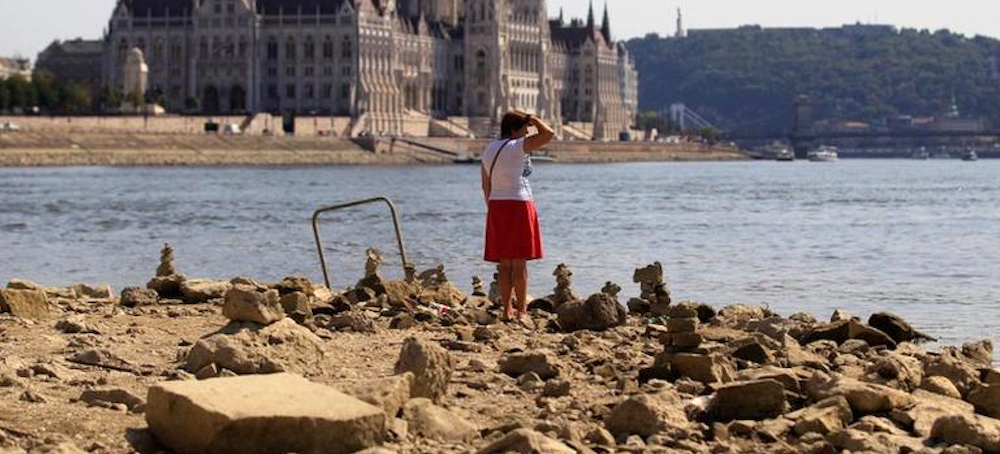 A woman looks on a shoal under the Margaret Bridge during the period of low water level in Budapest, Hungary. (photo: Bernadett Szabo/Reuters)
A woman looks on a shoal under the Margaret Bridge during the period of low water level in Budapest, Hungary. (photo: Bernadett Szabo/Reuters)
Global warming made drought that has gripped the Northern Hemisphere, from China to Europe to the U.S., 20 times more likely to occur
Climate change increased the odds of drought across the hemisphere by as much as 20 times, according to a new study from the research consortium World Weather Attribution, which specializes in the links between climate change and extreme weather events.
Zeroing in specifically on Europe, which saw one of its driest summers in decades, climate change may have made the drought three to four times more likely to occur.
The study was released Wednesday, just weeks after the summer’s end.
It’s the latest in a series of “rapid attribution studies” from World Weather Attribution, which this summer has examined the role of climate change on heavy rainfall in Brazil, record-breaking heat in the U.K. and devastating floods in Pakistan.
In this case, the researchers conducted two analyses: one focusing on most of the Northern Hemisphere, aside from the tropical regions, and one looking specifically at west-central Europe. Europe saw its hottest summer on record this year, and it experienced its driest conditions since 1950.
Drought can be defined in a variety of ways, from low rainfall to low river flows. In this study, the researchers looked at the dryness of the soil—a critical factor in plant growth. Low soil moisture is sometimes referred to as agricultural or ecological drought.
They found that in both study regions—in Europe and in the Northern Hemisphere at large—this summer’s drought was about a one-in-20-year event. That’s an event with about a 5 percent chance of occurring in any given year.
Looking at historical data, the researchers found that the odds of these kinds of severe droughts have increased over the last century. The researchers then used climate models to determine whether global warming was part of the reason why.
The models suggest that climate change has, in fact, played a role. Warming has made this summer’s level of drought around three to four times more likely to occur in Europe, and as much as 20 times more likely across the Northern Hemisphere.
Those are the best estimates, according to the model results. That said, there’s a lot of uncertainty around those numbers. That’s partly because drought is a fairly complex weather phenomenon compared to other events like heat waves or extreme rainfall, and soil moisture is also comparatively difficult to observe, quantify and reproduce in models.
Although the exact numbers might be up for debate, the researchers firmly conclude that climate change did play a major part.
“There is absolutely no doubt that climate change did play a big role here,” said Friederike Otto, a climate scientist at Imperial College London and co-lead of World Weather Attribution. “The exact quantification of that role is more uncertain for soil moisture than, for example, when we look at heavy precipitation.”
The study also uses climate models to take a look into the future. The world has already warmed by about 1.2 degrees Celsius—and if the planet hits 2 C, the odds of severe drought will increase even further. In some parts of the Northern Hemisphere, the likelihood could increase by as much as 15 times.
“That means the current one-in-20 year event will occur almost every year,” said Dominik Schumacher, a scientist at the Swiss Federal Institute of Technology Zurich and one of the study’s authors.
Follow us on facebook and twitter!
PO Box 2043 / Citrus Heights, CA 95611

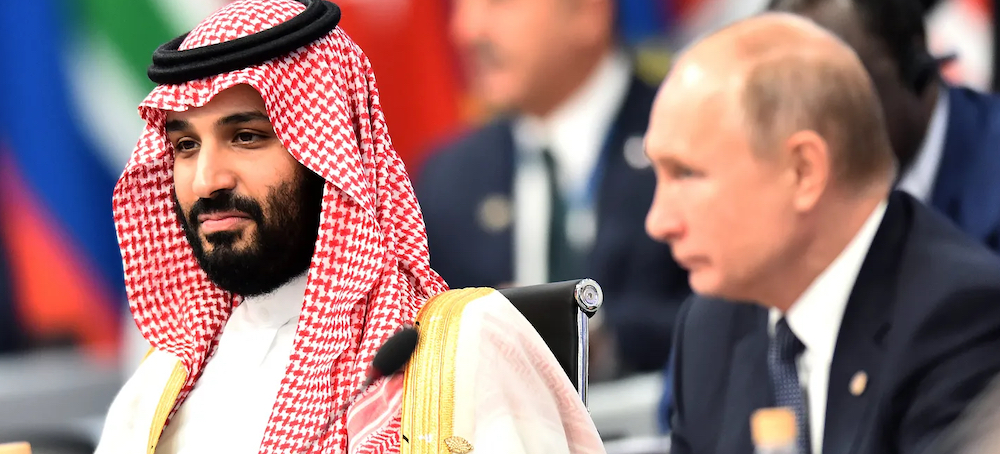

No comments:
Post a Comment
Note: Only a member of this blog may post a comment.